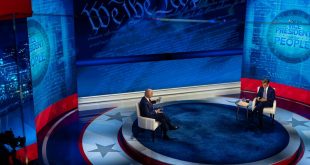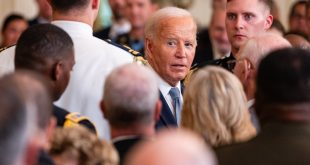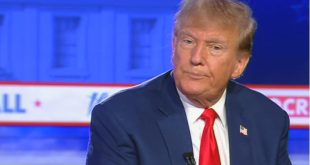That’s it form us for the evening. You can see my summary of the Tory leadership debate here and a summary of the day’s earlier events here. And, if you’d like to read yet more, my colleagues Rowena Mason and Jessica Elgot have the full story:
The defence secretary, Penny Mordaunt, who is backing Jeremy Hunt, said after the debate:
Tonight, Jeremy again showed that he is the candidate the country can rely on to deliver Brexit and also the leader we need to win a majority at the next general election and take our country forward.
Throughout the campaign, and all he has been dealing with as our foreign secretary, he has shown that he is a strong leader with solid judgment based on deeply-held values.
He is a leader with a clear vision, deep values and sound judgment. I see it and the public see it. I hope the membership do too because our country needs to come together, get Brexit done and show the world what our country can do.
Debate summary
That’s all from this evening’s debate, here’s a summary of the main points:
- Both candidates to be prime minister refused to explicitly denounce Donald Trump’s comments about ethnic minority congresswomen as racist. While both backed Theresa May’s criticism of the US president, who used racist language to attack political opponents at the weekend, neither was actually willing to describe the remarks in such terms.
- Boris Johnson refused to commit to lowering the net migration figure after Brexit. His opponent, Jeremy Hunt, said it was what people voted for when they voted to leave the European Union and to ignore that would constitute a “betrayal”.
- Johnson refused to say whether or not he had costed the no-deal Brexit he says the UK should seriously consider. He claimed the costs could be minimised with thorough preparation but said the Treasury would come up with “spine-chilling figures”. Hunt said there would be hefty costs but promised to hand out cash to deal with them.
- Johnson refused to apologise for homophobic comments he has made in the past. Both men talked up their records on LGBT rights and Johnson claimed to have been one of the earliest and most vociferous supporters. But he refused to apologise for language he used in newspaper columns in the past that display the opposite.
- Both men accused Jeremy Corbyn of being antisemitic. Hunt said: “Unfortunately, he may be,” while Johnson said he had allowed antisemitism to flourish, which amounted to the same thing.
- Each candidate refused to fully commit to ending the benefits freeze. But Hunt said he would end the five-week Universal Credit wait and would be sympathetic towards a plan to end a freeze on working age benefits freeze. Johnson refused to commit to any plan.
Will each continue to freeze fuel duty? Each refuses to say, adding they want to make no more spending commitments.
When was the last time each cried? Hunt refuses to answer. Johnson says it was when his bicycle was stolen from outside Parliament.
Will Ben Stokes get a knighthood? Each says yes.
Would Johnson keep Hunt as foreign secretary? He refuses to say, though he says he holds him in high regard. Johnson says he doesn’t think it’d be right to hand out jobs at this point.
Would Hunt return Johnson to the foreign office? He says he would give him a big job.
Will they go out for a pint after the contest? Both agree they would.
Who do they want to win Love Island? Hunt says he doesn’t watch it. Johnson says he has been watching vaguely, before asking the audience for help. He jokes that Amber should win, deliberately mistaking her for the work and pensions secretary.
They are asked: Is Jeremy Corbyn personally antisemitic?
“Unfortunately, he may be,” says Hunt, nodding.
“I think, by condoning antisemitism in the way he does, I’m afraid he’s effectively culpable of that vice, yes,” says Johnson.
The questions from the audience are finished, the candidates are moving to a “quick-fire round”.
Each says he would stick to the pledge to achieve zero net carbon emissions by 2050.
Asked about the difficulty young people have in getting on the property ladder, Hunt restates his “right to own” policy – under which he proposes to hand over land that has planning permission and invite young people to pay for a house to be built upon it.
Johnson says the UK must build much more “good quality part buy, part rent” homes to help young people who cannot afford a whole property immediately. These would be built on brownfield sites, he says.
Hunt says the work and pensions secretary, Amber Rudd, has persuaded him to end the five-week wait before people can claim Universal Credit, saying it was the right reform but had unexpected consequences. And he says he would look very sympathetically at Rudd’s proposal to end the freeze on working age benefits.
Johnson refuses to back the plan, saying he’s “probably made enough spending commitments in the last week for the time-being”.
The pair share a laugh about Rudd’s support as Hunt jokingly offers Johnson the DWP job.
Johnson and Hunt are asked what changes they would make to the tax system to help the lowest paid.
Johnson says he would raise the threshold for National Insurance and talks up the living wage. He repeats his somewhat opaque claim about his success in cutting poverty in London while serving as its mayor.
Hunt says the country cannot afford the reforms he wants to make but, once he feels it can, he commits to allowing people to earn their first £1,000 per month “without paying any tax or any National Insurance”.
The candidates are asked how much right the public have to know about a potential prime minister’s private life. Hunt says he’s happy to have had his wife with him on the campaign trail.
Johnson says he made it a rule years ago not to bring his family into his public life. His private life, of course, was the basis for serious questions about his character earlier in the campaign.
Both candidates commit to making a woman either chancellor, foreign secretary or defence secretary. Johnson did so after some hesitation, saying: “Yes, I think so. Well, I dunno. I’ve chucked it out there a – make of it what you will.”
The candidates are asked about diversity and LGBT rights – are they issues that are important to Tories?
Both respond that they are proud of their record on the latter while in government.
As Johnson finishes a point about having changed the rules to allow British embassies to fly the Rainbow Flag because the country must stand for its values, he is asked if he will, therefore, apologise for writing about “tank-topped bumboys in the Ministry of Sound” in a column.
If you’re going to excavate and disinter every single quotation from the millions of words I have written, you can of course try and twist things one way or another but I have a very proud record.
He claims he was one of only a small number of Tories to support gay marriage when he was first elected to Parliament.
 Top Naija News – Nigeria News, Nigerian News & Top Stories Top Naija News – Nigerian Newspapers, Nigerian News. topnaijanews is a daily Nigerian newspaper covering Latest News, Breaking News, Entertainment, Sports, Lifestyle and Politics.
Top Naija News – Nigeria News, Nigerian News & Top Stories Top Naija News – Nigerian Newspapers, Nigerian News. topnaijanews is a daily Nigerian newspaper covering Latest News, Breaking News, Entertainment, Sports, Lifestyle and Politics.



